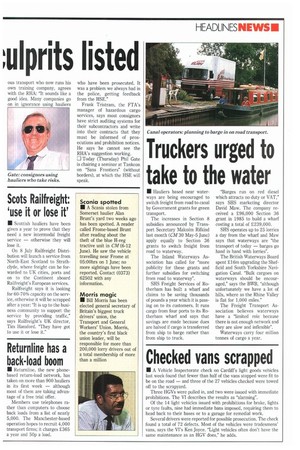Truckers urged to take to the water
Page 7

If you've noticed an error in this article please click here to report it so we can fix it.
• Hauliers based near waterways are being encouraged to switch freight from road to canal by Government grants for green transport.
The increases in Section 8 subsidies announced by Transport Secretary Malcolm Rifkind last month (CM 30 May-5 June) apply equally to Section 36 grants to switch freight from road to waterway.
The Inland Waterways Association has called for "more publicity for these grants and further subsidies for switching from road to waterway".
SHS Freight Services of Rotherham has built a wharf and claims to be saving thousands of pounds a year which it is passing on to its customers. It runs cargo from four ports to its Rotherham wharf and says that savings are made because dues are halved if cargo is transferred from ship to barge rather than from ship to truck. "Barges run on red diesel which attracts no duty or VAT," says SHS marketing director David Maw. The company received a £96,000 Section 36 grant in 1985 to build a wharf costing a total of £239,000.
SHS operates up to 25 lorries a day from the wharf and Maw says that waterways are "the transport of today — barges go hand in hand with lorries".
The British Waterways Board spent £.16m upgrading the Sheffield and South Yorkshire Navigation Canal. "Bulk cargoes on waterways should be encouraged," says the BWB, "although unfortunately we have a lot of hills, where as the Rhine Valley is flat for 1,000 miles."
The Freight Transport Association believes waterways have a "limited role because there is not enough network and they are slow and inflexible".
Waterways carry four million tonnes of cargo a year.
























































































